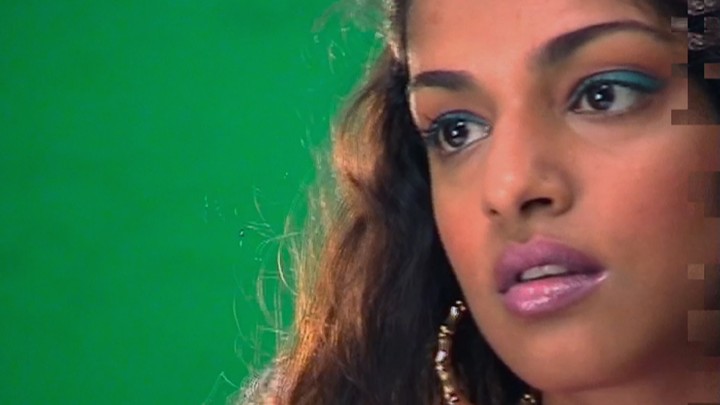The title - Matangi/Maya/M.I.A. - implies a straightforward progression: Sri Lankan birthname, Anglicised family name, stage name. The film it has been attached to, a swirling patchwork of home video and other found footage from which themes emerge and recede, is in fact several things simultaneously: a positioning tool for an artist with a new album in the pipeline; a career retrospective, detailing how a would-be documentarist who found herself too brown for Britpop wound up making her own planet-spanning beats; a complex and tricky interjection in the identity debate; and - at the last - a look at the pros and cons of being an outspoken celebrity in the age of social media. Perhaps the slashes in the title aren't meant to resemble endpoints as the fences Matangi "Maya" Anupragasam, commonly known as M.I.A., has had to straddle as a second-generation migrant, a female creative, and a globally recognised star.
Much of this footage was shot, and has now been organised - in as much as it can be said to have been organised - by director Steve Loveridge, an old friend of Maya's from their days together as art students at St. Martin's College in the early 1990s. There are immediate advantages to having an insider on this assignment. For starters, the subject is visibly relaxed around these cameras; we get a sense of what it might be like just to hang with M.I.A. as she puts a track or video together, and indeed what it was like to be backstage as she was adjudged to have violated the sanctity of the Super Bowl, as she apparently did by raising a middle finger to TV viewers during the halftime concert in 2012. What leaps most forcefully off the screen during sequences such as this is the singer's unflappable, no-fucks-given personality. Early on, we find the teenage Maya in conversation with her older sister about their father, a leading light in the Tamil resistance movement - hailed as a hero by some, damned as a terrorist by others - who stayed put while the rest of his family decamped to South London in 1985. The sister is visibly upset that her dad hasn't bothered to send so much as a birthday card in the subsequent years; Maya, very much the sunny-side-up branch of the family, flips the situation on its head by saying this absent figure (glimpsed only briefly here, whereupon he resembles less some murderous radical than a middle manager) has instead given the family the greater gift of independence.
There's an underlying toughness in that dressing-up and making-do, but in Maya's case, at least, such independence manifests itself in a playful, hands-on enthusiasm rather than the control freakery commonly associated with our pop stars: we see the young Maya assiduously stencilling the artwork for her first demo, while the narrative arc shuttles her through several eyecatching promos overseen by familiar male names (Zombieland's Ruben Fleischer, Romain Gavras) to a point where she's started to direct her own videos. The young Maya's tutors at St. Martin's would be proud. What Loveridge assembles to bolster that throughline can seem hazy. Several times, he cuts back to a 2001 trip the singer took to her strife-torn Sri Lankan homeland, but it's never entirely clear why. To anchor the subject in place? To break up the jolly japes going on back in Notting Hill? It's just possible the film is a whirlwind because its subject is a whirlwind; that organising everything around her has resulted in the turbulent, unsettled form. In conversation with a friend, M.I.A. describes herself as "unmanageable", and there's plentiful evidence to suggest this might well be the case: several sequences elicit the conspiratorial pleasures that follow from a director letting his camera run on a subject letting her mouth run. (I can't see Madonna, for one, being too thrilled with one diatribe, but that may be karmic payback for how Madge treated Kevin Costner during the filming of In Bed with Madonna.)
Some wider outside perspective might have been in order during the Super Bowl sequence, acknowledging that the overreaction of the American news media to a gesture commonly observed on the top decks of West London nightbuses prompted an equal overreaction on the singer's part ("This is worse than if I'd murdered someone!"). Watching the rough treatment meted out to the star in certain quarters - ranging from the coded racism of Fox News to Bill Maher's not untypically glib condescension - we might well understand Maya's desire for a biographical overview, delegated to a loyal and long-standing associate, which takes a kinder, gentler tack. Yet Matangi/Maya/M.I.A. continually raises worthwhile questions it keeps ducking away from, such as: is it possible for an uncompromising artist to marry a private equity heir and still retain her independence? (Her divorce from Ben Bronfman in 2012, unmentioned here, suggests possibly not.) The M.I.A. who emerges from these ninety minutes is a fascinating idea for a pop star - this listener has long felt that precisely the least fascinating thing about her is her music: overbusy hip-hop, streaked with vivid-annoying sounds and textures - but it's an idea the film never fully gets to grips with in the way one might like. Loveridge's final, generous gesture to a subject who is also plainly a pal is to let Maya dance away, unbowed, into the night.
Matangi/Maya/M.I.A. is now available on DVD through Dogwoof.

No comments:
Post a Comment